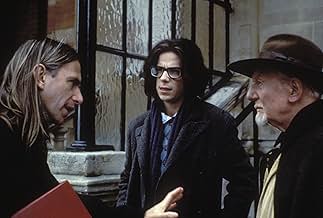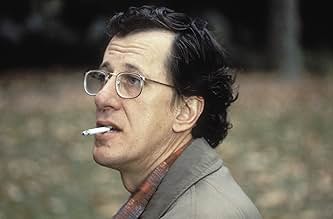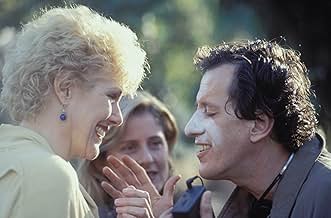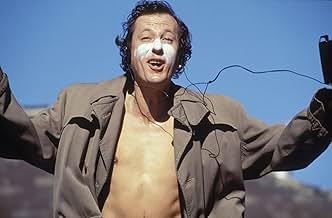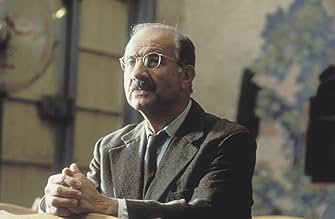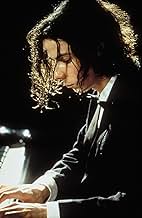AVALIAÇÃO DA IMDb
7,6/10
57 mil
SUA AVALIAÇÃO
O pianista David Helfgott, conduzido por seu pai e professores, tem um colapso. Anos mais tarde, ele retorna ao piano, para aclamação popular, se não da crítica.O pianista David Helfgott, conduzido por seu pai e professores, tem um colapso. Anos mais tarde, ele retorna ao piano, para aclamação popular, se não da crítica.O pianista David Helfgott, conduzido por seu pai e professores, tem um colapso. Anos mais tarde, ele retorna ao piano, para aclamação popular, se não da crítica.
- Ganhou 1 Oscar
- 46 vitórias e 52 indicações no total
- Direção
- Roteiristas
- Elenco e equipe completos
- Produção, bilheteria e muito mais no IMDbPro
Enredo
Você sabia?
- CuriosidadesGeoffrey Rush had once learned the piano up until aged fourteen. He took up piano lessons again thirty years later for this movie and also acted as his own hand double and body double.
- Erros de gravaçãoThe character shows all signs of schizophrenia; not bipolar disorder (formerly known as "manic-depressive disorder"), as is claimed in the film. The real David Helfgott likewise displays many symptoms of schizophrenia and none of bipolar disorder.
- Citações
Cecil Parkes: You must play as if there's no tomorrow.
- Cenas durante ou pós-créditosHimself: hand double for Geoffrey Rush
- Trilhas sonorasWith A Girl Like You
Written by Reg Presley
© 1966 Dick James Music Limited
Performed by The Troggs
© 1966 Mercury Ltd. London
Avaliação em destaque
Okay, so I did some reading after this driven by idle curiosity about the account. The real Helfgott didn't spend 15 years abandoned in a room with a piano, he didn't have to stand in the rain outside of a bar before they would let him in. He was pretty well known in the local scene as a pianist, his father was not a Holocaust survivor and David had been married before. Father and son were never really estranged and David was present at his funeral.
But just the same, the 'objective' point-of-view that purports to explain him, or any of us at any time based on a few facts, is in the end no less hypocritical than any attempt to pass dramatization as 'the real story'. This matters. Someone can be present at a funeral without being truly present, and someone can feel forgotten and alone even when they're factually surrounded by people, estranged from a parent even when formally this was never so.
The film is at a simple emotional level where the attempt to conquer a maddening complexity (music, life) snaps the tethers of mind and in due time the reconfiguring of this damage into blossoming art. The moral is that we must keep trying and hope for the best, perhaps the worthiest lesson even if it appears slightly trite in the context of a more or less happy ending.
Still, why feel the need to invent all those things, knowing you are doing so? When the violence inflicted on the son could be inferred by a more ambiguous tension instead of an outright beating.
Because, it seems, we can only choose to accept the lesson if at the center we find a good soul worthy of the saving. In other words, it is not the fact that he gives a great last recital that matters, but that he plays at all; not that a genius was salvaged because he might never have been that, but a human being. And this is what rankles so much Helfgott's critics who find him borderline incompetent in his playing - he is cheered on in concerts because he is the character from this film.
Ideally we would be able to discern all these points here instead of one harmony: the truly damaged but kind soul, the inability to place blame for that damage on any ogre father or Holocaust, and being able to somehow experience his music (the real Helfgott recorded for the film) as a trained ear would, fixated flourishes followed by distraction and incompetence according to critics, musically extending the damaged self.
For a more demanding film on the same subject of madness and transcendent musical genius see a little known film on a medieval composer called Death in Five Voices: all about the dissonance between different voices trying to harmonize a story and this carried in the music itself.
But just the same, the 'objective' point-of-view that purports to explain him, or any of us at any time based on a few facts, is in the end no less hypocritical than any attempt to pass dramatization as 'the real story'. This matters. Someone can be present at a funeral without being truly present, and someone can feel forgotten and alone even when they're factually surrounded by people, estranged from a parent even when formally this was never so.
The film is at a simple emotional level where the attempt to conquer a maddening complexity (music, life) snaps the tethers of mind and in due time the reconfiguring of this damage into blossoming art. The moral is that we must keep trying and hope for the best, perhaps the worthiest lesson even if it appears slightly trite in the context of a more or less happy ending.
Still, why feel the need to invent all those things, knowing you are doing so? When the violence inflicted on the son could be inferred by a more ambiguous tension instead of an outright beating.
Because, it seems, we can only choose to accept the lesson if at the center we find a good soul worthy of the saving. In other words, it is not the fact that he gives a great last recital that matters, but that he plays at all; not that a genius was salvaged because he might never have been that, but a human being. And this is what rankles so much Helfgott's critics who find him borderline incompetent in his playing - he is cheered on in concerts because he is the character from this film.
Ideally we would be able to discern all these points here instead of one harmony: the truly damaged but kind soul, the inability to place blame for that damage on any ogre father or Holocaust, and being able to somehow experience his music (the real Helfgott recorded for the film) as a trained ear would, fixated flourishes followed by distraction and incompetence according to critics, musically extending the damaged self.
For a more demanding film on the same subject of madness and transcendent musical genius see a little known film on a medieval composer called Death in Five Voices: all about the dissonance between different voices trying to harmonize a story and this carried in the music itself.
- chaos-rampant
- 31 de dez. de 2013
- Link permanente
Principais escolhas
Faça login para avaliar e ver a lista de recomendações personalizadas
- How long is Shine?Fornecido pela Alexa
Detalhes
- Data de lançamento
- País de origem
- Centrais de atendimento oficiais
- Idiomas
- Também conhecido como
- Shine
- Locações de filme
- Empresas de produção
- Consulte mais créditos da empresa na IMDbPro
Bilheteria
- Orçamento
- US$ 5.500.000 (estimativa)
- Faturamento bruto nos EUA e Canadá
- US$ 35.892.330
- Fim de semana de estreia nos EUA e Canadá
- US$ 162.179
- 24 de nov. de 1996
- Faturamento bruto mundial
- US$ 35.999.121
- Tempo de duração1 hora 45 minutos
- Cor
- Mixagem de som
- Proporção
- 1.85 : 1
Contribua para esta página
Sugerir uma alteração ou adicionar conteúdo ausente

Principal brecha
By what name was Shine - Brilhante (1996) officially released in India in Hindi?
Responda



